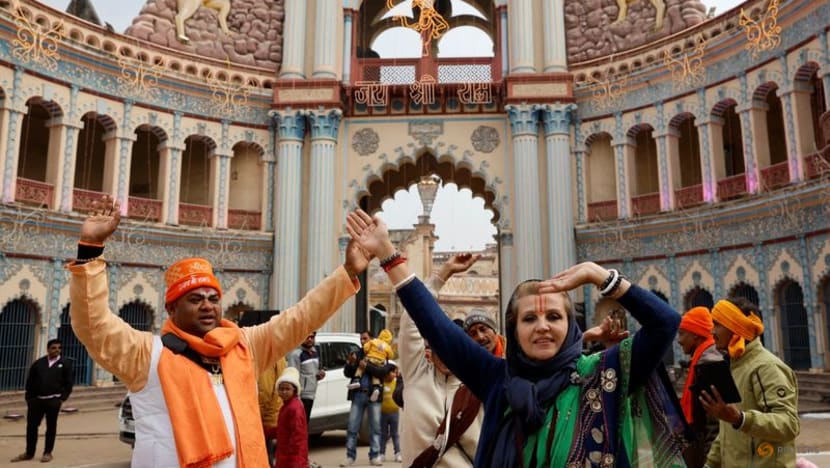India election: Will the controversial Ram temple boost BJP’s chances? Voters, experts say no
The Hindu temple is located in the northern town of Ayodhya, which goes to the polls this week in the world’s largest election.

Hindu devotees dance on a street during the inauguration of the Hindu Lord Ram temple in Ayodhya, India, Jan 22, 2024. (Photo: Reuters/Adnan Abidi)

This audio is generated by an AI tool.
NEW DELHI: As the world’s largest election reaches the halfway mark in India this week, analysts said that the controversial Ram temple has not become as big of a draw for voters as the governing Bharatiya Janata Party (BJP) had hoped.
The Hindu temple is located in the northern town of Ayodhya, which goes to the polls on Monday (May 20).
Its inauguration by Prime Minister Narendra Modi in January, in time for the elections that began on April 19, was seen as his trump card to secure a rare and historic third term in power.
However, experts said this has not panned out. Voters also told CNA that they will instead consider issues like unemployment, inflation, and the rising cost of living at the ballot box.
CONTROVERSY OVER TEMPLE
The temple is built on the site where Ram, one of the most revered Hindu gods, was believed to have been born more than 7,000 years ago.
A mosque stood there for centuries before it was torn down in 1992 by Hindu mobs led by senior leaders of the BJP, some of whom are still around. It triggered the worst religious riots in India’s post-independence history, killing 2,000 people – most of them Muslims.
Mr Modi’s inauguration of the temple undermined one of the founding constitutional principles of India – that it is a secular country with equal rights for citizens of all religions, an analyst previously said.
The construction of the temple was a longtime promise of BJP, with some noting that it was the only constant in the party’s manifesto for 24 years since 1996. The fact that it was completed and inaugurated during an election year could benefit the party, said experts.
OPPOSITION STAYING AWAY FROM TALKING ABOUT TEMPLE
On the other hand, Ayodhya has caused an issue for the opposition.
Some opposition parties – including the country’s largest one, the Indian National Congress – boycotted the inauguration.
Congress leader Rahul Gandhi said that it was a “completely political Narendra Modi function”.
Congress leads the opposition Indian National Developmental Inclusive Alliance (INDIA) bloc, which comprises more than two dozen parties.
The opposition alliance has been seen as a united front in taking on Mr Modi and the BJP for a victory when results are announced on June 4.
The alliance, which has not campaigned in Ayodhya barring a regional opposition party fielding a candidate to run there, has accused Mr Modi of using the Ram temple to create a divide between Hindus and Muslims for electoral gains.
In turn, Mr Modi has hit back at Congress’ refusal to talk about the temple this election season.
When he recently sought blessings at the temple in the midst of the polls, he said that any Congress leader who visits it out of devotion is removed from the party.
Mr Modi also alleged that Congress would shut down the Ram Temple if they came to power – something the party has denied.
Political watchers said the opposition does not want to play into BJP’s communal rhetoric, but not addressing the temple could in fact work in the opposition’s favour.
Author and analyst Nilanjan Mukhopadhyay said: “I think the opposition parties are seeing that the Ram temple issue is not resonating in this election as much as the BJP anticipated it.
“The opposition also understands that economic issues like price rise and unemployment is what is resonating with the voters and is actually a very big issue, and which is putting BJP on the defensive.”
Voters whom CNA spoke to agreed, with surveys also showing the lack of jobs and rising cost of living as top voter concerns.
One voter named Yash said: “This time, people will not vote on religious lines. People will vote for development and against unemployment, inflation and price rise.
“The way the cost of living is increasing in the country, people will vote keeping these things in mind.”
COHESIVENESS BENEFITS OPPOSITION
Analysts said fighting elections on people’s issues is proving to be beneficial for the alliance.
Being more cohesive - by strategically contesting seats and minimising vote-splitting – could lead to the opposition denting the BJP’s target of improving its performance from 2019, they added.
A lower voter turnout in the initial four phases of voting, compared to the 2019 election, has also made Mr Modi’s ruling party vulnerable.
Mr Mukhopadhyay said he does not know how campaigning on people’s issues will impact the election just yet, but he noted that the BJP is “very seriously worried” about the opposition.
“I would actually label Mr Modi as the biggest publicist of the Congress manifesto,” the analyst quipped.
“The number of times he has referred to the Congress manifesto possibly matches the number of times any senior Congress leader has done so.”















